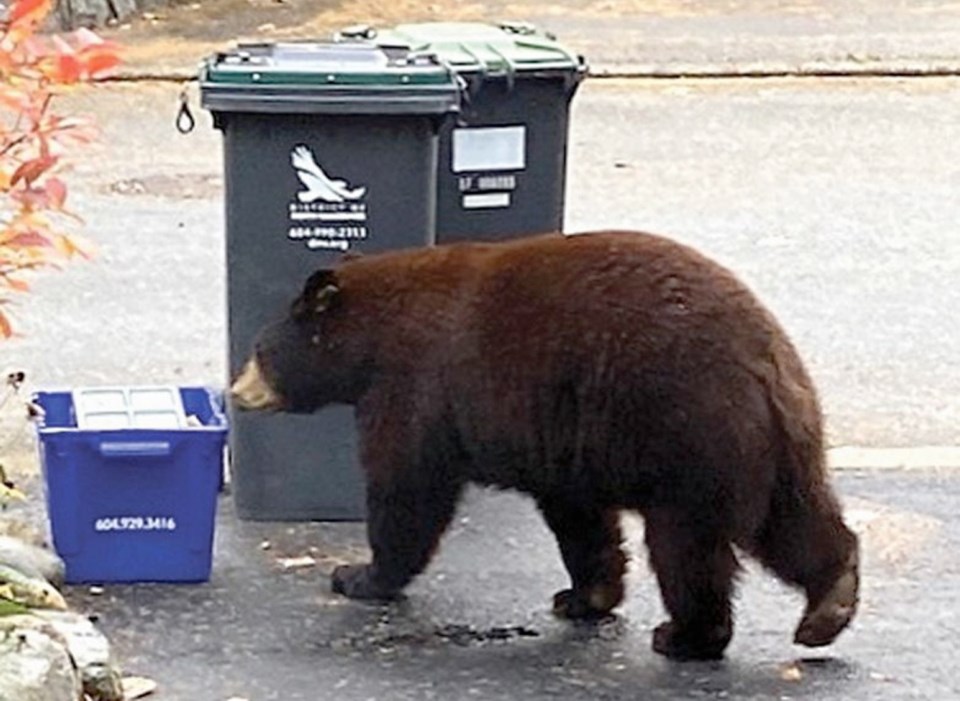Four black bear carcasses discovered along a logging road near Campbell River late last month were not cubs and it isn’t known if they were killed there or dumped.
Ben York, an inspector with the B.C. Conservation Officers Service, said Wednesday the remains of the four animals included hides and some bones. He said the bears likely ranged in age from two to four years.
York added it isn’t clear if the bears were illegally killed.
While the investigation at the site has been completed, he would not reveal if any evidence had been collected to suggest violations, such as bullet holes, shell casings or tire tracks.
York said some details are held back “in case they become important later on.”
The remains were at an advanced stage of decomposition, and the area where they were found is close to Campbell River and known to be used by people disposing of the remains of animals, he said.
“It may not be a violation,” said York. “It is acceptable to return carcasses to the wilderness for carrion. We do ask hunters to be discreet when doing that.”
An area resident who discovered the bodies of the four bears on May 26 reported that they looked like cubs, judging by small sizes of the hides and other remains, which included a skull.
York is asking anyone with information to contact the conservation service tip line at 1-877-952-RAPP.
The Fur Bearers, a Vancouver-based non-profit group that advocates for fur-bearing animals in the wild and captivity, is offering a $1,000 reward for anyone with direct information that helps solve the case.
As bear calls increase this spring, the conservation service is urging everyone living in both remote and urban areas to secure “major attractants” such as garbage, as well as bird and pet foods. Black bears have been reported in all areas of the Island, including recently at the University of Victoria, Beaver Lake and View Royal. “We can’t change the behaviour of bears, but we can change the behaviour of humans,” said York.
In a conference call Wednesday, Chris Doyle, deputy chief in charge of operations for the B.C. Conservation Officers Service, confirmed bear-human contact is increasing as more people venture outdoors after self-isolating at home during the pandemic.
Two women — a mother and her adult daughter — suffered minor injuries in a bear attack Tuesday while they were walking with their dogs on a logging road near Prince George. A conservation officer said the one of the women’s dogs startled the bear while it was eating in a bushy area, and the bear lunged at the dog. In the ensuing struggle, one woman was bitten on the arm, while the other was scratched.
The service’s predator attack team investigated and decided not to pursue or euthanize any bears, citing the remoteness of the location, and the conclusion of both the team and the two women that the bear was merely acting in self-defence.
Meanwhile, Doyle said a man is facing wildlife charges after RCMP found a black bear cub in a cage on a remote property near Hudson Hope.
On Haida Gwaii, the conservation service is investigating a case of a black bear shot and illegally dumped. The young bear was discovered by recreational divers on a beach on the Pesuta Shipwreck Trail.
York noted several reports about two grizzly bears in the Sayward Valley, but so far, there has not been any dangerous contact with residents.
The larger grizzly has been spotted in the estuary and inside the village, leading to a lockdown of the local school last week.
The conservation service closed two forestry recreation camping sites north of Campbell River where the other grizzly was reported. York said some people were fined for ignoring the closure earlier this month.
The Sayward grizzlies aren’t demonstrating any problematic behaviour — they’re just “doing what bears do,” said York, noting the service keeps tabs on bears that get in close proximity to humans. “If we have a situation where an animal shows behavioral changes for public-safety risk, then we will look at relocating them.”
York stressed that it’s normal for grizzlies to swim to Vancouver Island — typically young males looking for new territory — and said there is no indication of a breeding population on the Island.
The fine for intentionally feeding or attracting dangerous wildlife, including bears, is $345. Leaving attractants accessible to bears can net a fine of $230.
A homeowner who leaves garbage out when there are bears in the area would probably face the lesser ticket, said York. “The intentional feeding is things like throwing a sandwich to a bear on the side of the highway or feeding a bear in your backyard to view wildlife.”
He said a particularly egregious violation or a repeat offender could be sent directly to court and a judge would make the call on penalty.
— With files from the Vancouver Sun



